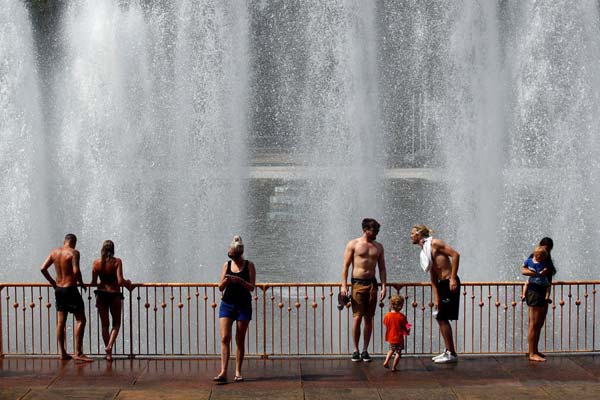Heat wave triggers fatal fires in Portugal as London bakes
Blistering heat, a lack of rain, and lightning strikes have caused raging forest fires in Portugal that have killed 67 people in extreme weather that meteorologists predict will continue across much of Europe for the next few days.
|
 |
|
People cool down near a fountain in Battersea Park during a hot day in London, Britain June 21, 2017. [Photo/Agencies] |
The United Kingdom's Met Office forecast the hot weather will continue, with the mercury in London rising to its highest level for 40 years. But it said there will be thunderstorms in Britain's south later on Wednesday, before temperatures climb again before the weekend.
BBC Weather forecaster Chris Fawkes said: "You can see, from how long ago we last had temperatures like this in June, how rare it is. We do see temperatures going up to 30C, but if it breaks 34C, which I think it will, it will be the hottest June day for over 40 years.
"The summer of 1976 was a classic. But to have these really prolonged spells, you need a block of high pressure that directs other weather fronts away. Then, we get the hot weather coming up from Europe."
In 2003, scorching weather conditions in mainland Europe was thought to have caused as many as 35,000 deaths. France was the worst hit, with 14,802 people dying as a result of excessive heat, according to the Washington-based Earth Policy Institute.
The World Meteorological Organization estimated back in 2003 that, as average temperatures rise, the number of heat-related deaths worldwide could double in 20 years.
France, Italy, Spain, and Portugal are all susceptible to seasonal forest fires, and this week's blaze in Portugal may be the first of many across Southern Europe, experts warned.
The UK, Spain, France and Portugal all have amber heat-wave warnings in force, which is one level below that of national emergency.
In the UK, commuters were warned to carry plenty of water on morning and evening rush-hour trains.
National Rail said speed limits may be in operation on some rail lines because extreme heat could buckle rail lines and affect points and signaling equipment.
AccuWeather forecaster Tyler Roys warned that the heat wave could also trigger smog and poor air quality, particularly in cities with high traffic density.
Few reliable figures are available for deaths from heat worldwide. In 2015, Scientific American cited EM-DAT, an international disaster database, as saying heat waves caused 128,885 deaths worldwide between 2000 and 2015.









